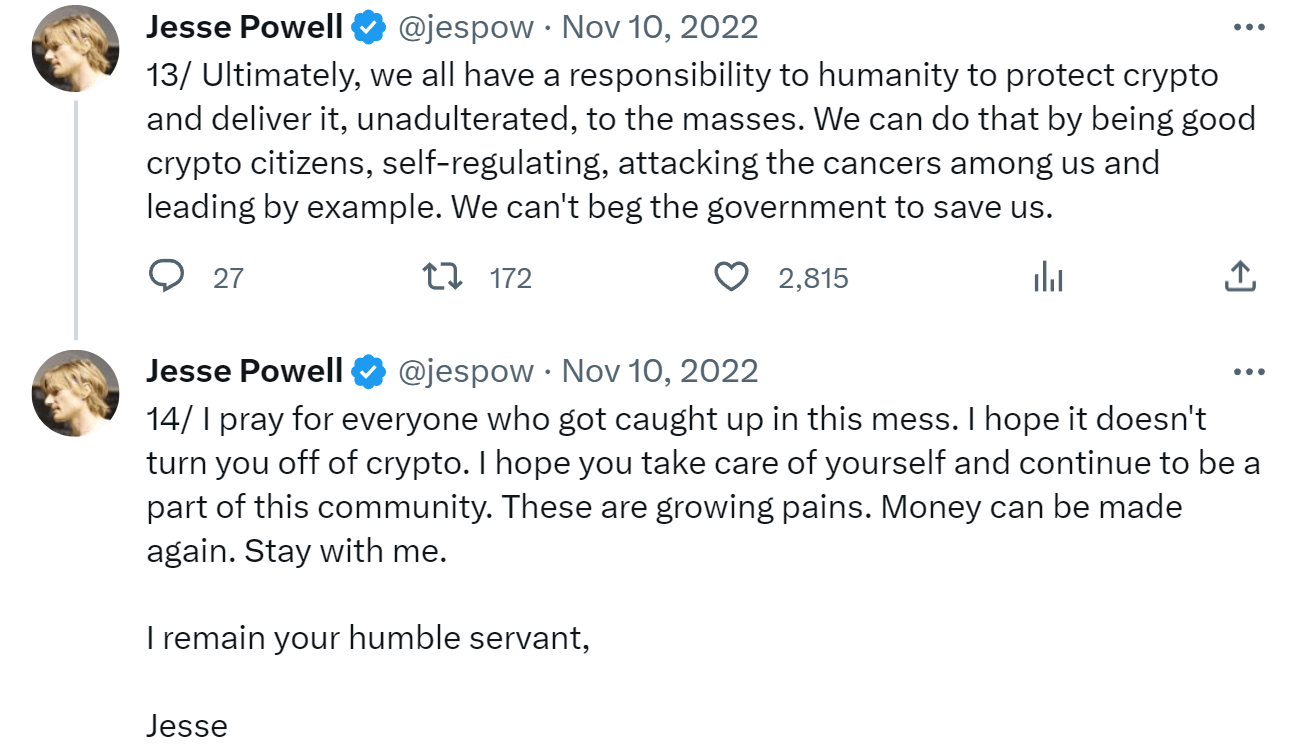
General,THORChain (RUNE)
TradFi is the Problem, DeFi is the Solution
November 15, 2022
If you’re eating at a restaurant and it gets robbed, does that mean you’ll get food poisoning?
Of course not, they’re separate subjects. They have nothing to do with each other. So, when people use the collapse of FTX as a reason to criticize crypto, they’re totally out to lunch.
The collapse of FTX is justification to criticize traditional finance (TradFi), not crypto. FTX could have been an exchange for stocks or bonds or real estate, it doesn’t matter. What matters is they ran their business the exact same way as failed financial institutions of the past. Leverage, fractional reserve banking, and misappropriating customer funds.
If you don’t know what I’m talking about, FTX is a centralized exchange (CEX) that has become insolvent. It’s the reason for the recent selloff in bitcoin and the broader crypto market. This Reuters article does a good job summarizing the situation.
Exclusive: Behind FTX's fall, battling billionaires and a failed bid to save crypto
The gist of the story is simple. FTX was gambling with their clients money, and no one is willing to bail them out.
FTX was supposed to have $16B in reserves to cover their client deposits. However, FTX moved $8B over to their investment arm, Alameda Research, to invest on their own book. Alameda was one of the few companies that came to crypto’s rescue when the market was crashing this summer. Turns out it wasn’t Alameda after all, it was FTX’s clients without their knowing.
Now Alameda is falling apart, which means they can’t pay back the $8B, leaving FTX high and dry, which means FTX clients are going to be left holding the bag.
Any of this sound familiar? This is how all traditional financial institutions have failed in the past. You know the situation with FTX/Alameda exists 100x over in TradFi. It's what lead to the crash in 2008. It would have happened again in the crash of 2020 had the Fed not bailed everyone out with more QE.
But there’s no bailouts for anything crypto related. It’s on its own.
So, there could be more contagion from this, more dominoes to fall. I don’t know, only time will tell. I noticed BlockFi has suspended their client withdrawals which isn’t surprising since they were one of the companies bailed out by Alameda this summer.
I was starting to believe the bottom for bitcoin was in June because we had a wave of defaults all at once, a real capitulation event. Then the dominoes stopped falling and the market went sideways from there.
Now with FTX/Alameda blowing up, it could set off a new chain of events causing another wave of defaults in the crypto sector. We’ll see. You should be buying when there’s blood in the streets, but I’d say only do a tranche. Be prepared for the potential of lower prices in the weeks to come. If that happens, then I believe it will be like this June where everything falls apart all at once. If there’s a wave of new defaults but they’re spread out over the next several months, then the market should be able to digest them without causing volatility in the sector. With all the pain crypto has been through this year, I gotta think we’re putting in a bottom soon.
This process sucks in the short term, but long term it will make crypto stronger. While TradFi clings to life support with its bailouts, the longer it takes to unwind its mess, the worse it will be. Whereas with crypto, it keeps going through these cleanses, which makes it healthier going forward.
Get Your Crypto off CEXs
Everyone who understands crypto always stresses the risk of exchanges like FTX collapsing, and therefore, stresses the importance of holding your crypto off centralized exchanges. You can buy/sell your crypto on the exchange but don’t let it sit there for long periods of time. For long term holdings you should always transfer it to cold storage, like a Trezor and Ledger. Even a hot wallet on your phone like Trust Wallet, or a browser extension like XDEFI, are better than a CEX in my opinion.
If you’re not going to listen to the advice above and still leave your crypto on an exchange, then at least use the reputable ones.
If you live outside of North America, I think Binance is your safest bet. CZ, the founder and CEO, understands the core ethos of crypto and supports it. Sam Bankman-Fried (SBF), the founder and CEO of FTX, was very public about his lack of support for the ethos of crypto. I will expand on this in my next writeup.
If you’re in North America I think you should use Kraken. The founders and management are true cypher punks/crypto anarchists. Co-founder and chairman, Jesse Powell, is also an advocate of self-custody. If Kraken was doing any fractional reserve banking, then Jesse wouldn't be promoting people withdraw their crypto from his exchange. So, I like to think he’s on our side.
Jesse is pretty worked up about the collapse of FTX too.
Even though I think Kraken and Binance are two of the better exchanges, they’re still CEXs. Despite being run properly, they could still succumb to an attack from hackers and have funds stolen or an attack by regulators and have funds frozen.
This is why a decentralized exchange (DEX) is so important. To understand the difference between a CEX and DEX lets go back to basics.
Satoshi described bitcoin as:
Completely decentralized, with no central server or trusted parties, because everything is based on crypto proof instead of trust.
Whereas FTX can be described as:
Completely centralized, with a central server and trusted parties, because everything is based on trust instead of crypto proof.
See the difference? Read that as many times as it takes for it to burn into your brain. It’s not hard to grasp but it’s crucial to understanding crypto and how to differentiate between the quality projects and the garbage.
A real DEX would embody the characteristics of bitcoin. As it stands, there is one DEX that does.
THORChain - the One and Only True DEX
One of the biggest problems in crypto is centralized custodians and THORChain is literally the solution. THORChain is the solution to FTX and its ilk. THORChain is the solution to companies like Celsius, a large lending platform that blew up this summer taking client deposits down with it. THORChain is the solution to horror stories like Quadriga and Mt. Gox.
THORChain is completely decentralized, with no central server or trusted parties, because everything is based on crypto proof instead of trust.
Since THORChain relies on crypto proof instead of trust, there can never be any fractional reserve banking. Every token must be accounted for down to the decimal. Since it’s decentralized, no single node can control user deposits. THORChain is economically secure, which means the nodes have more money to lose than gain should they try to collude to steal from users. Every aspect of the design is meant to protect user deposits and trades. Unlike TradFi where their operations are opaque at best, THORChain is open source. Anyone can inspect the code and audit the crypto on the exchange.
THORChain is the first and only DEX that can trade bitcoin and other major cryptocurrencies. There are DEXs like Uniswap and PancakeSwap, but they’re limited to ERC-20 and Binance Smart Chain tokens respectively. They can’t trade the most important token of them all, bitcoin.
This is why I’m so bullish on THORChain. This is why I left Sprott to start a fund to invest in THORChain. THORChain is truly one of a kind and it solves a very big problem in crypto.
THORChain is true decentralized finance (DeFi).
It’s a sleeping giant.
Thank you for reading.
I’m the founder of Youxia Crypto, an asset management company specializing in crypto. I can help you buy and sell precious metals too. I believe crypto is more than just about trying to make money, it’s about creating freedom for oneself and the rest of the world. I’m a contrarian, voluntaryist, and proponent of Austrian Economics. I enjoy downhill skiing, scuba diving, live music, yoga, and traveling.
The intended use of this material is for informational purposes only and is not intended to be an offer or solicitation for the sale of any financial product or service or a recommendation or determination that any investment strategy is suitable for a specific investor. Investors should seek financial advice regarding the suitability of any investment strategy based on the objectives of the investor, financial situation, investment horizon, and their particular needs. This information is not intended to provide financial, tax, legal, accounting or other professional advice since such advice always requires consideration of individual circumstances. The investments discussed herein are not insured by the FDIC or any other governmental agency, are subject to risks, including a total loss of the principal amount invested. Past performance is no guarantee of future returns.




